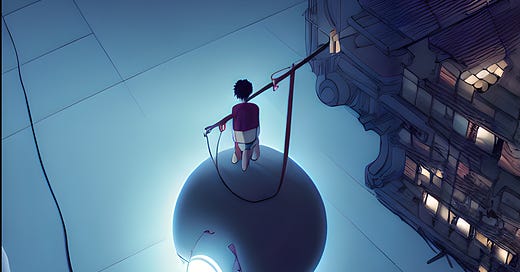Sorry - today’s essay is abstract even by my standards. Can’t be avoided :(
The Globe is both subject and object, transcendent and immanent. There’s no making sense of ‘humanity’ without the Globe; and what lies beyond is something else - call it non-humanity, call it post-humanity. There’s a famous saying of Kant that goes:
The Globe isn’t as big as the starry heavens and it doesn’t exhaust the moral law, but it has quite a bit of both, and therefore, it fill our minds with admiration and reverence. But there’s something unique about it:
We know there’s something beyond the Globe; but there’s no way for us to grasp that which lies beyond without running into contradiction. That’s either a cause for caution or a signal that we need to leap into the great beyond. I am inclined to practice my long jump.
The Globe is a limit: a limit of thought, a limit of politics, a limit of society….We will need to probe its limits, but before we do so, a word from our sponsor. At the beginning of the Critique of Pure Reason, Kant says:
That’s Kant’s Copernican revolution in philosophy. One way to think about objects conforming to our cognitions: the world isn’t intelligible without an organizer. Kant argues that two kinds of naive views are untenable:
1. The "objective" view that there's a world out there independent of who's in it. This is the standard scientific view grounded in the physicist's perspective that there's a vast universe out there well beyond any human presence. Of course, paradoxically, the physicist also believes that the objective universe can be grasped through mathematics and in particular, is the material outcome of rational laws. Which, in turn, grounds the next naive view:
2. That reason can grasp the bare structure of the universe, that there's a special kind of knowing that sidesteps our finite, bodily condition and gets to the truth.
Kant denies both of these possibilities. If we agree with him, we also believe there's no such thing as bare existence, or even if there is, it won't make sense so there's no point in talking about it.
These are important insights, but I want to suggest a line of development that abstracts away from Kant's particular identification of the organizer role. Kant identifies the organizer with the rational (human) subject, and in doing so, gives the subject an active role in the constitution of the world. I am thinking: organizer, yes, but organizer as subject: maybe not. We can acknowledge the need for organization while abstracting it away from the subject.
What if we replace the subject with the Globe as the primary organizing principle?
What exactly does that mean? How does the Globe organize the world? The transition from the Subject to the Globe is a three step process:
Replace the subject with some other organizing principle - can be anything: society, biological evolution etc. We can just as easily say: it’s the state that helps us make sense of the world, or more abstractly, it’s the mode of production that helps us make sense of the world. Lesson 1: there are many organizers.
Turn the organizer slot into a variable. So far, we have only dealt with constants, i.e., each organizer - subject, society etc - is a fixed entity. Instead, assuming that the organizer slot is dynamic and can be filled by several entities and we don’t need to determine that entity beforehand. Lesson 2: the organizer is a slot, not an individual.
The Globe denotes the variable itself, i.e., it’s identified with the organizer slot per se, and not a specific occupant of that slot whether that be the subject, Dasein, the genome or society. Lesson 3: the Globe is the name for the slot itself.
The Globe is a whole, but a relational one: THAT which stands in the organizer relation to the world, whatever that might be. Having sketched that outline, we can glimpse the future of globalization:
Abstract a "science" of organizers from the various instances we have seen in the wild: from Kant’s Subject to Husserl’s subjectivity to Uexkull’s organism to Heidegger’s Dasein to Luhmann’s Society.
We have to start with a descriptive science of the essential features of organizing. The idea is to keep it simple (don’t laugh!): suggest an intuitive shift from a specific organizer to the class of organizers as a whole.
Once again, sorry for writing an essay that may come across as word salad.








